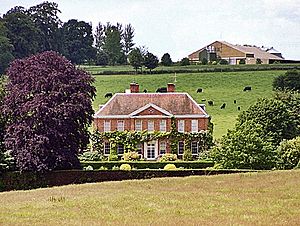William Guidott facts for kids
William Guidott (1671–1745) was an English lawyer and politician. He came from places called Laverstoke and Preston Candover in Hampshire. He was a member of the Whig political group and served in the British Parliament, known as the House of Commons, for many years between 1708 and 1741.
Early Life and Education
William Guidott was the oldest son of William Guidott and his first wife, Grace. He was born in 1671.
When he was 14, in 1685, he started studying at New Inn Hall, which was part of Oxford University. A year later, in 1686, he began studying law at Lincoln's Inn in London.
In 1698, William took over from his father. He became the Steward of Andover in 1703, a job he held for the rest of his life. In 1706, he married Jane Hunt. The next year, in 1707, he became the lawyer for the important Marlborough family, taking over from his uncle.
Political Career
William Guidott became a Member of Parliament (MP) for Andover in 1708. He was a member of the Whig party. He won his seat without anyone running against him in both the 1708 and 1710 elections.
As an MP, he made important votes. In 1709, he voted to allow Protestants from Palatine (a region in Germany) to become British citizens. In 1710, he voted to impeach Dr. Sacheverell, a clergyman who was accused of speaking out against the government.
In 1710, William Guidott married his second wife, Jane Child. He continued to be an active MP. In 1711, he voted for "No Peace Without Spain," which meant he wanted the war with France to continue until Spain was secured for the British side. In 1713, he voted against a trade agreement with France.
He won his seat for Andover again in 1713, even though there was a contest this time. He was re-elected as a Whig in 1715. He supported the government on important laws, like the Septennial Act in 1716, which changed how often elections were held. He also supported the Peerage Bill.
In 1719, he became a bencher at Lincoln's Inn, which is a senior position for lawyers. He was re-elected for Andover in 1722.
William Guidott lost his seat in the 1727 election after some disagreements. However, he was elected again in a special election in 1730. After this, he often voted with the Opposition, which means he voted against the government's plans. He was re-elected without opposition in 1734.
Later Life and Family
In 1739, William Guidott married his third wife, Patience Soper. They lived in Preston House, a home he built in Preston Candover near Basingstoke, and also in Andover.
William Guidott did not have any children. After his death in 1745, and his wife's death in 1749, Preston Candover passed to a relative named William Woodroffe. William Woodroffe then took the name Guidott to continue the family name.
 | Emma Amos |
 | Edward Mitchell Bannister |
 | Larry D. Alexander |
 | Ernie Barnes |


